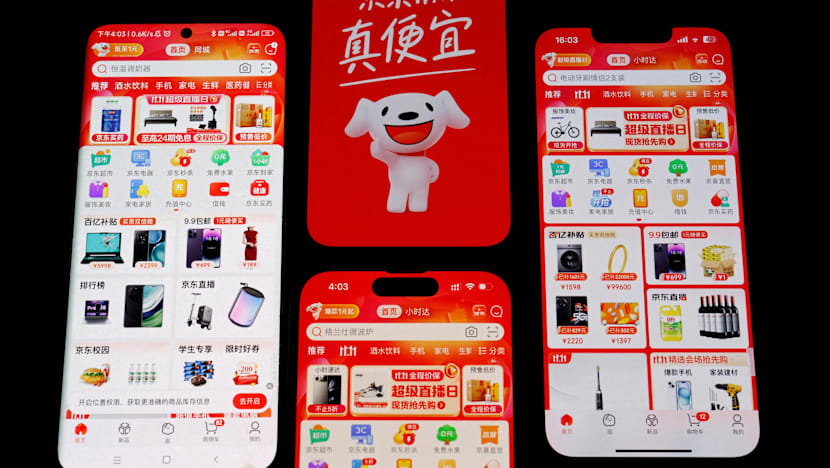AI gives China’s Singles’ Day head start as retailers see early sales boom
This year, Chinese e-commerce platforms turned to AI tools, also launching earlier campaigns ahead of Singles’ Day to court shoppers after a lacklustre Golden Week holiday.

The logo of e-commerce app JD.com is displayed among mobile phones displaying the app, in this illustration picture taken on Oct 25, 2023. (File photo: Reuters/Florence Lo)
SINGAPORE: China’s biggest shopping event kicked off early this year, and retailers have been reaping the rewards after a muted holiday spending season.
Held annually on Nov 11, Singles’ Day is China’s largest online shopping festival, marked by massive discounts, livestream marathons and shopping galas across major e-commerce platforms.
It has become the world’s biggest shopping event since its launch in 2009, eclipsing the likes of Black Friday and Amazon’s Prime Day, with total estimated sales of US$156.4 billion (1.14 trillion yuan) in 2023 and US$200 billion in 2024.
Chinese e-commerce retailers and platforms got a head start this year - utilising and deploying AI tools and technology to enhance customer engagement, improve operations and boost sales.
JD.com, the country’s largest retailer, kicked off Singles’ Day promotions on Oct 9, a day after the end of Golden Week, an extended eight-day holiday this year which combined the National Day and Mid-Autumn Festival breaks.
Kuaishou, a popular video e-commerce platform, launched its Singles’ Day promotions even earlier on Oct 7 to gain a competitive edge against rival Douyin, which started its own campaign just days later on Oct 9.
The early rollout appears to have paid off.
JD.com saw sales of more than 52,000 brands surge over 300 per cent between Oct 9 and Oct 13, according to a report by the China Daily state news outlet, adding that more than 3,300 product categories recorded year-on-year growth of over 100 per cent.
Alibaba, which launched presales on Oct 15, deployed AI widely across its Taobao and Tmall platforms - integrating large language models into core search and recommendation engines.
Vice president Liu Bo, also president at Tmall, said results were “better than expected”, with 35 sellers surpassing sales of 100 million yuan (US$14 million) within the first hour of presales.
Sales of beauty products and consumer electronics were also strong among shoppers, with AI-related products seeing a nearly 200 per cent year-on-year increase in sales via JD’s online marketplaces, according to China Daily.
New launches such as Apple’s iPhone 17 series and Xiaomi’s 17 lineup helped drive demand, alongside hits like Apple’s AirPods 4, Watch S11, Xiaomi’s 17 Pro Max and Nintendo’s Switch console, each topping 10 million yuan in first-hour sales.
Beauty products also remained popular among shoppers, with eight brands each surpassing 100 million yuan in sales within the first 10 minutes, according to data released by Tmall.
Chinese cosmetics brand Proya was the first to break the 100 million sales mark on Oct 20, Tmall said, alongside popular beauty giants like Estee Lauder, SK-II, Lancome and Loreal.
CHANGING CONSUMER HABITS
Robust sales during the early Singles’ Day shopping period come after weaker average spending during this year’s Golden Week holiday, which fell to a three-year low despite an increase in inbound travel.
Average spending per trip during this year’s Golden Week break reached 911.04 yuan, down 0.55 per cent from the same period last year, according to Reuters calculations based on government data published this week.
It marked the lowest since 2022, when spending fell to 680.6 yuan as a result of the pandemic lockdowns.
The success of an earlier Singles’ Day this year continues to reflect spending habits of value-conscious Chinese shoppers, with rational consumption remaining the overarching trend, experts say.
But extending the shopping period also has mixed effects.
Fu Yifu, a researcher at Su Merchants Bank, told the Yicai Global news service that longer shopping periods could also lead to fatigue among shoppers weaving through thousands of promotions and ads across various platforms.
Instant retail, a trend built on the promise of immediate satisfaction, has been transforming how Chinese shoppers shop, experts noted.
Hong Yong, an associate researcher at the Chinese Academy of International Trade and Economic Cooperation, told the Xinhua state news agency Xinhua that the rise of instant retail is shifting traditional sales events away from bulk “stockpiling” orders toward a “buy now, get now” model of instant consumption.
The approach, he added, is collapsing the gap between decision and delivery, allowing consumers to receive their purchases almost as soon as they make them.
A commentary piece published on Oct 14 in Worker’s Daily, a national Chinese-language newspaper, said consumer scepticism still remained among many shoppers hoping to score the best and most reasonable deals. Online, many businesses offer only token discounts of just a few yuan off, it said, providing little real savings.
Long promotional periods could also affect shoppers’ moods, it added, with many remaining cost-conscious. “Simplifying rules is only the first step,” the piece said. “What truly wins consumers (over) is sincerity in pricing and substance in the shopping experience.”

















